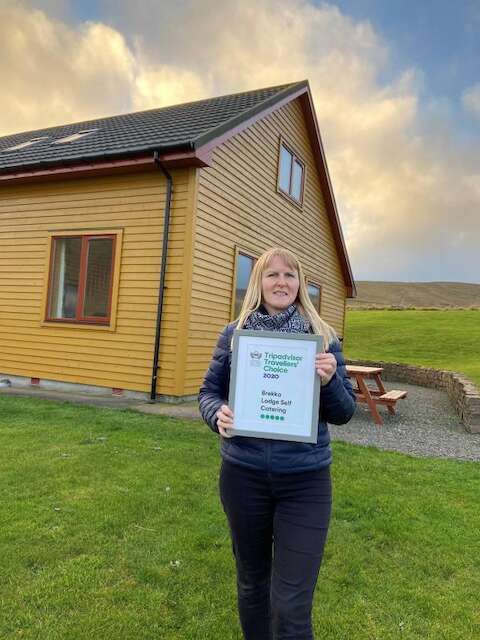SFAD board member Sheila Keith, whose day job is as policy officer for Shetland Fishermen’s Association, is speaking about interactions with guests at her Brekka Lodge self-catering property in Fladdabister near Cunningsburgh.
Shetland is renowned for offering a hospitable welcome and she is determined that tourists are easily able to enjoy fresh local cuisine in ways that do justice to the delicious produce on offer.
As well as fishing and tourism she has an interest in agriculture – with a family croft where you'll find sheep and some Shetland cows – and she spent 15 years in economic development.
When you factor in her drive and positive attitude, it’s easy to see why Sheila is such a good fit as board member for an organisation committed to working with hospitality and tourism businesses to give visitors the best possible experience.
SFAD chairwoman Marian Armitage says Sheila's professional role “provides the board with really valuable up-to-the-minute insights into the work of Shetland’s biggest industry” while her economic development background “brings a vital perspective in the work we do for our members”.

After completing a business studies degree in Aberdeen in the 1990s she moved home and a chance call from Morgan Goodlad – she didn’t know he was the SIC’s chief executive at the time – resulted in a post coordinating sponsorship for the Tall Ships races in 1999.
Sheila, now 46, describes it as the “best first job ever” and recalls herself and colleagues Ruth Henderson and Gillian Fry becoming known as “the lasses that axed for what we wanted”.
Community events in their now familiar twenty-first century form were “just starting off, so lots of folk were keen to get involved” but “we were really disappointed there was no Shetland food provision”, with outside caterers having to be brought in.
“It made me think that there has to be something more done with local food and drink in Shetland,” Sheila says. “Now we have a far better food offering. There’s so many opportunities for entrepreneurs out there.”
After that she worked for a sales company called Shetland Seafish. While the business eventually collapsed due to the economic circumstances at that time, she feels it helped introduce greater focus on the provenance of seafood in every step of the process. Out of that a number of local fish buyers, including L. Williamson’s and Shetland's Finest, have grown and thrived.
“That was the start of building a good cornerstone for acknowledging this excellent seafood product for Shetland,” she says. “I learned a lot about how to sell fish, what buyers wanted, how factories worked, the need for accreditation to back up your reputation… and I learned an awful lot about managing an office!”
The job introduced her to many folk in the fishing industry and instilled an appreciation, and respect for, “how hard the fishermen work for the produce that they put on plates, and that’s not to be underestimated”.
Shetland Seafish’s demise coincided with the end of most whitefish processing amid a recognition that “freezing fish and selling it to somebody in New Zealand wasn’t the best way to go”.
“The catching side of the industry has changed dramatically too,” Sheila says, recalling the decommissioning of boats in 2002: “It was a really terrible time for the local fleet, with perfectly good boats scrapped by the dozen right across Scotland. We’ve come a long way from those days, fortunately, with healthy fish stocks and modern, highly efficient new vessels.”
Indeed, the internet’s growing prominence in the early part of the new millennium would transform many aspects of the industry.
Sheila then took up a post with Shetland Development Trust at a time when it was investing heaving in loans and grants to grow the economy, with a strong focus on seafood.
Some of those investments were certainly not without controversy. But away from the higher profile headlines Sheila quietly worked away on a host of schemes, often being asked to draw on her industry experience.
There were equity schemes and loans for fishing boats, the development of factories and small-scale processing units, mentoring schemes for new fishermen and the nascent phase of growing mussels and farming salmon (then largely under small-scale local independent ownership).
When Shetland Fishermen’s Association approached her in 2017 it was “an offer I couldn’t refuse, and I’ve enjoyed it ever since”.
It was a year after the UK voted to leave the EU – while the majority in Shetland voted against Brexit, the fishing sector is one of its strongest advocates owing to a long-held desire to escape the constraints of the disliked Common Fisheries Policy.
Sheila deals with the “local nitty-gritty”, freeing up chief officer Simon Collins to “go off and do what he’s really good at” externally. Earlier this year – minus any fanfare due to Covid-19 – gleaming new fishmarkets were completed in Lerwick and Scalloway, and she foresees an exciting time for the industry.


